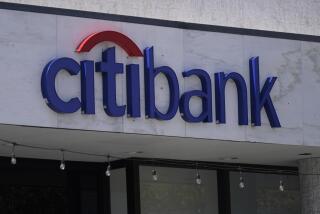Brazilian Bank Told to Pay $28 Million in Loan Pledge Suit
- Share via
A Los Angeles jury has handed down a $28-million judgment against a Brazilian bank in a case that seems bound to fuel the controversy surrounding so-called lender liability lawsuits.
The Superior Court jury found Banco do Brasil guilty of fraud and breach of contract in its refusal to extend a promised $2-million loan to an auto parts business owned by an Iranian immigrant family. The jury imposed punitive damages on both the bank and one of its officers.
The bank, partly owned by the Brazilian government, had lent about $1.5 million to a Los Angeles auto parts company that was purchased by Amanollah Sarbaz and his son Manoucher in 1982. The Sarbazes, who owned a Mazda assembly plant in Iran before fleeing that country in the wake of the 1979 revolution, claimed that they purchased the business based on assurances from the bank that the business was in good shape and that they would be able to draw on a $2 million line of credit.
The Sarbazes claimed that the bank and its chief representative in Los Angeles, Joao Stefanon, had no intention of extending additional credit, knowing that the parts business was virtually bankrupt. Rather, the suit charged, the bank viewed the Sarbazes as saviors who would enable it to recover the money previously lent.
The jury set damages at $3.6 million for breach of contract and $1.9 million for fraud, and $22 million in punitive damages against the bank and $500,000 against Stefanon personally.
Appeal Planned
Frank Wong, a lawyer for Banco do Brazil, said: “We are obviously going to appeal, and we are confident that our position will be vindicated at the appellate level.”
The Sarbazes’ attorney, Daniel Shulman, said the bank “thought they could fool a Los Angeles jury the way they fooled our clients.”
A wave of controversial lender-liability lawsuits has swept across California since the early 1980s, the most notorious of which led to a $47-million judgment against the Bank of America in a suit filed by two apple growers. That judgment was thrown out on appeal and will be retried in Sonoma County.
Lender-liability cases generally stem from alleged breaches of oral promises or other bad faith acts by lenders which nonetheless fall outside standard contractual provisions. They most often emerge from business failures.
The banking industry maintains that most such suits are little more than a means of avoiding repayment of debts by manipulating emotionally pliable juries and that the suits will make banks reluctant to lend money to small businesses. However, others believe that they provide proper punishment for unethical banking practices.
John Freidemann, a Los Angeles banking lawyer not involved in the Sarbaz suit against Banco do Brasil, said the trend at the appellate level has been to curb lender-liability awards. “There has been a swinging back of the pendulum” on such cases since they hit their peak several years ago, he said.
Despite some efforts by banks to promote legislative remedies for lender-liability suits, Freidemann said “the biggest changes will result from a change in the attitude of banks.”
“This was novel five years ago, and now it’s on the tip of everyone’s tongue,” Freidemann continued. “And a better awareness on the part of banks of the possibility of being sued will curtail these suits. You see a number of cases where banks were not forthright, and lawyers advising banks are telling them to tell the truth to borrowers.”
More to Read
Inside the business of entertainment
The Wide Shot brings you news, analysis and insights on everything from streaming wars to production — and what it all means for the future.
You may occasionally receive promotional content from the Los Angeles Times.










